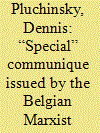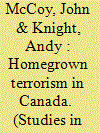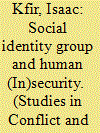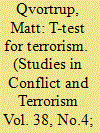|
|
|
Sort Order |
|
|
|
Items / Page
|
|
|
|
|
|
|
| Srl | Item |
| 1 |
ID:
137796


|
|
|
|
|
| Summary/Abstract |
This section of Studies in Conflict & Terrorism is dedicated to the reprinting of selected, translated terrorist communiqués that provide insights into the mindset, worldview, or operational thinking of a group. In terms of communiqués, this section employs the following typology of terrorist communiqués. There are three types of terrorist communiqués: attack, strategic, and special. Attack communiqués are issued to claim responsibility for an attack, explain the target selected, and provide the political rationale for attacking the target. A strategic communiqué is a longer document that is issued to provide strategic direction or commentary on political events, issues, and developments relevant to the group's cause and constituency. It can be used to explain changes of strategy or reinforce the strategic direction of the group. The special communiqué is similar to the attack communiqué in that it is event-driven but addresses non-attack events like anniversary dates, hunger strikes, elections, deaths of leaders, ceasefires, issuing threats or warnings, annual progress reports, issuing apologies, and so on. All three communiqués are issued publicly and intended to influence various audiences.
|
|
|
|
|
|
|
|
|
|
|
|
|
|
|
|
| 2 |
ID:
137794


|
|
|
|
|
| Summary/Abstract |
Like many nonstate military actors, Hamas has long provided social services to its constituents, but the mechanism by which charity leads to increased public support is poorly understood. This article argues that providing charity benefits nonstate actors not because it isolates recipients or acts as a bribe but because it allows organizations like Hamas to overcome the legacies of their own military activities and extremist ideologies. Service provision allows them to demonstrate that they are not merely soldiers or ideologues, but capable bureaucrats and managers as well.
|
|
|
|
|
|
|
|
|
|
|
|
|
|
|
|
| 3 |
ID:
137793


|
|
|
|
|
| Summary/Abstract |
The article examines how global trends related to militant Islamism have influenced patterns of homegrown terrorism in Canada. It seeks to understand how an evolving movement has shaped three case studies, two cases of homegrown terrorism, the case of Momin Khawaja, the “Toronto 18” plot, and the emerging trend of extremist travelers. Recognizing the notable gap in the literature, a growing number of cases of homegrown terrorism and extremism in Canada suggest that further study is required. The article asks why Canadians choose to participate in this movement and why militant Islamist movements are actively recruiting them.
|
|
|
|
|
|
|
|
|
|
|
|
|
|
|
|
| 4 |
ID:
137792


|
|
|
|
|
| Summary/Abstract |
The article uses social identity group theory and human insecurity to examine the rise of the Islamic State in Iraq and the Levant (ISIL). After first defining social group identity and its characteristics, the article reviews the Al Qaeda ideology that serves as the foundation of ISIL, before turning attention to the message and legacy of Abu Musab al-Zarqawi and their profound influence on ISIL. The article concludes by arguing that only by ending the marketplace of identities can stability be restored to Iraq and Syria.
|
|
|
|
|
|
|
|
|
|
|
|
|
|
|
|
| 5 |
ID:
137795


|
|
|
|
|
| Summary/Abstract |
Can electoral reform lead to a reduction in the number of terrorist incidents? Economists have shown that the introduction of constitutional institutions such as courts in the early eighteenth century had a direct effect on investment. Could there be a similar link between the introduction of proportional representation (PR) electoral systems and a reduction in the number of terrorist attacks? Previous studies using cross-sectional data have found a negative correlation between the presence of PR-electoral systems and the number of terrorist incidents. However, earlier studies were based on aggregate figures, not on time-series data. They did not provide a direction that could be used to measure the possible effect of the introduction of PR. This research note addresses this problem. Using a paired samples t-test it is possible to show that the introduction of proportional representation in Northern Ireland and Algeria led to a marked reduction in the number of terrorist attacks. The note thus adds strength to earlier studies.
|
|
|
|
|
|
|
|
|
|
|
|
|
|
|
|
|
|
|
|
|